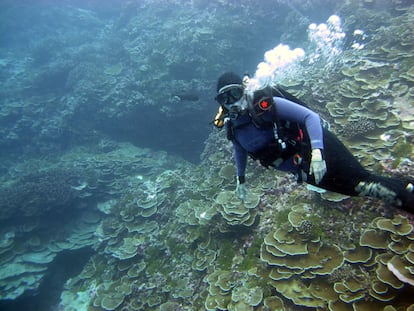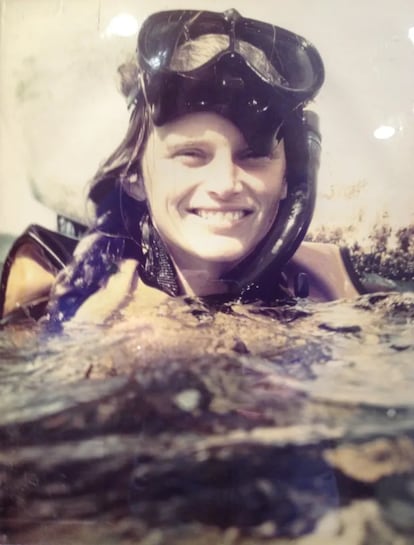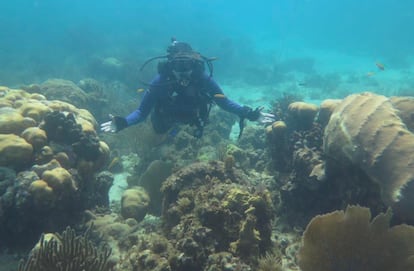Nancy Knowlton, marine biologist: "We scientists need to speak out against Trump."

Nancy Knowlton was born 75 years ago in Evanston, Illinois, but spent almost every summer of her childhood by the Atlantic Ocean. Her grandparents lived on Long Island Sound, between Connecticut and New York, and it was there that she discovered that if you took a snail out of its shell, it couldn't get back in. That desire to observe, learn, discover, and understand led her to graduate in biology from Harvard University and earn a doctorate in zoology from the University of California. She has spent 50 years studying coral reefs and the creatures that inhabit them, including snails.
Knowlton visited Spain to give a talk at the eighth edition of the Starmus Festival , recently held on the Canary Island of La Palma. In a face-to-face conversation with EL PAÍS, the American biologist discusses how the seabed has changed in recent decades, the loss of biodiversity, and the threat of climate change. Knowlton is critical of US President Donald Trump's policies , which she describes as "crazy," and urges scientists to unite and speak out—not just as experts, but as citizens.
Question: In 2009, you started giving talks about the good news for the ocean, and the Ocean Optimism movement was born from that. Why?
Answer: At the University of California, I created a program where I trained students in biodiversity and conservation. We gave talks to students about ocean problems, and they were all really depressing. At one point, I thought that in medical school, for example, they don't teach students how to write obituaries, because medicine is about figuring out how to make things better. All we were doing was teaching students how to write increasingly detailed obituaries about the ocean. So I discovered that even marine conservation professionals had no idea about the great successes in their fields. You have to give people the sense that they can do something about it, otherwise, they won't care about the problems and won't take action.
Q. Still, a week ago, the Trump administration authorized fishing in the world's largest marine protected area, northeast of Hawaii, established during Barack Obama's first term . How does this news affect global marine conservation?
A. This will make things much worse, and the truly absurd thing is that it will worsen fishing, because we know that when marine protected areas are created, the fish that live there grow larger, and the females produce many more eggs. It's an exponential relationship. This has been shown in various places, like the Great Barrier Reef (in Australia), where half of the reef fish come from marine protected areas. And in Hawaii, they actually increased fishing capacity thanks to the migration of fish from protected areas to fishing grounds. Not only is this bad for marine conservation, but it's actually detrimental to fisheries and the fishing economy.
Q. Are you concerned about the wave of layoffs, closure of diversity programs, and political interference at numerous American institutions and universities?
A. [The US science system] is being dismantled . There are two things happening. One is that a whole new generation of scientists is being depressed, their careers destroyed by these measures. Another, in a much broader sense, is that the hardest thing is restoring trust. For example, when you create a marine protected area, people need to have confidence that, although there will be short-term challenges, things will improve in the long run. That social cohesion is necessary. Trust in the United States and in science are being eroded by these decisions. That rupture is the hardest thing to repair. It can be done, but it takes decades. And the same thing happens with the collapse of scientific systems.
Q. The attacks on science have not stopped, even though universities like Harvard are standing up to Trump.
A. When it all started, people were paralyzed. There were too many things happening at once. But now they've started to come together and say, "No, this isn't right." The funny thing is that everything [the Trump administration is doing] is justified in terms of competition with China. And this is strengthening China, not weakening it. All of this is not only horrible for people and for diversity, but it's also counterproductive. It's completely insane, as well as a tragedy.
Q. What should be the role of scientists in this context?
A. We have to speak out. Now, I think politics is a matter of values, and science doesn't address values. Scientists don't tell you what you should do, but they do tell you what will happen if you do certain things. And in that role, scientists have every right to speak out as what they are. But they can also speak out as citizens and say, "I oppose this because it violates my sense of right." Science doesn't dictate policy, but it does tell you what the consequences of bad policy will be. And we have to talk about it.

Q. Is there a fear of standing out in the scientific community?
A. Very scary. I'm already retired, and there's nothing anyone can take away from me. I have the freedom to express myself and speak as a citizen, not as a representative of an institution or company. For people whose jobs are at stake, it's much more difficult. For universities, which risk being targeted and attacked, it's even more difficult. And marine conservation organizations, for example, also receive money from the US government. I think some of Trump's measures will be defeated in court, but it's still daunting to risk your job or, in terms of an organization, your mission. I feel for the people who have to make these decisions. They're not easy.
Q. In this context, is there room for optimism?
A. People are realizing that unity is strength. We need to come together to talk about what's happening and what the consequences will be for the well-being not only of the people of the United States, but of the world. It's not like we're locked in our rooms with no permission to go out. We can talk in public places, with our friends and neighbors. And young people are truly engaged. They don't like to see the future destroyed. I come from the generation that protested the Vietnam War, that fought for a long time. And that changed the world. We can change it again.
Q. Going back to that time, at the beginning of your career, What was the first time you saw a coral reef up close like?
A. It was the summer of 1974, on the north coast of Jamaica. Jamaica and the rest of the Caribbean have suffered greatly from coral loss, but back then, living coral reefs stretched as far as the eye could see. The seabed was covered with spectacular corals, and the water was crystal clear. You could see clearly for a hundred meters. It was so beautiful and inspiring that it seemed like they would be there forever. At the time, I wasn't worried about anything happening to them.

Q. What has changed since then?
A. We've lost about 50% of all the world's coral, and reefs are among the ecosystems most sensitive to human impact. In Jamaica, for example, there was a major hurricane in 1980 that destroyed all the corals. Corals should be able to recover because they're like plants: they break, mend, and grow back. But they never came back. It was a combination of the hurricane's effects, fishing exploitation, and the lack of animals to eat the algae. We went from having the bottom covered in living coral to only being covered in algae. That story has been repeated in many other places, and global warming has greatly increased the risks. Now, every few years, sometimes even every year, there are huge heat waves in the ocean that kill even more corals.
Q. Is climate change the biggest threat to the seabed today?
A. Definitely. Not just for coral reefs, but for ocean ecosystems around the world. When I started my career, the threats were fishing and, in some places, pollution. We used to think of climate change as something we'd have to worry about in the future. But climate change is now.
Q. How does it affect coral reefs?
A. Corals have tiny plant cells called zooxanthellae within their tissues, which are very sensitive to temperature. If the temperature rises one or two degrees above average, the relationship with the coral is broken; they are expelled and die. Zooxanthellae provide much of the coral's color, which is why their death is called bleaching. When they leave the coral, it becomes transparent, and its skeleton is visible. It's as if everything covering our bones becomes translucent. Corals can survive this bleaching if it's not too prolonged or severe. If not, they die of starvation, and if the heat is too intense, it's as if they are cooked.

Q. Part of your work focuses on understanding this process and on the so-called invisible biodiversity of corals. What is it?
A. Inside a coral reef, there are cracks and crevices, and that's where all the biodiversity resides. It's like a tropical rainforest, where the true diversity lies in all the tiny insects moving around. Inside the corals, there are crabs, shrimp, tiny snails, and worms. We call it hidden biodiversity because it's not visible from a distance and because, being so tiny, no one has studied it. Many of these creatures don't even have scientific names. With tracking devices, which we place on the corals for a year, we've found up to 700 different species.
Q. What has studying the invisible taught you?
A. You realize that small things tend to change at a faster pace. A lot is happening [on the planet], but hidden from our eyes. It's important to understand what makes corals happy and what makes them unhappy, because they are the organisms that create the underwater city in which the rest of the reef creatures live. Until now, we have ignored most of the diversity of coral reefs and its impact.
Q. An example?
A. There's a type of snail, called the cone snail, that releases highly potent neurotoxins to kill its prey. These toxins together are also dangerous to humans, but individually and in small doses, some can act as painkillers . It's like using Botox to remove wrinkles: in large doses, Botox is a deadly poison, but in small doses, it's very useful medically.
EL PAÍS

%3Aformat(jpg)%3Aquality(99)%3Awatermark(f.elconfidencial.com%2Ffile%2Fbae%2Feea%2Ffde%2Fbaeeeafde1b3229287b0c008f7602058.png%2C0%2C275%2C1)%2Ff.elconfidencial.com%2Foriginal%2F015%2F665%2F3e2%2F0156653e27e4cb906056406f98bdccf3.jpg&w=3840&q=100)

%3Aformat(jpg)%3Aquality(99)%3Awatermark(f.elconfidencial.com%2Ffile%2Fa73%2Ff85%2Fd17%2Fa73f85d17f0b2300eddff0d114d4ab10.png%2C0%2C275%2C1)%2Ff.elconfidencial.com%2Foriginal%2F665%2F28d%2Ff39%2F66528df3982054ce4779f5b4ef7d7ccf.jpg&w=3840&q=100)

%3Aformat(jpg)%3Aquality(99)%3Awatermark(f.elconfidencial.com%2Ffile%2Fa73%2Ff85%2Fd17%2Fa73f85d17f0b2300eddff0d114d4ab10.png%2C0%2C275%2C1)%2Ff.elconfidencial.com%2Foriginal%2Fc5e%2F4da%2F353%2Fc5e4da353859baa32434dd72ff8bf593.jpg&w=3840&q=100)